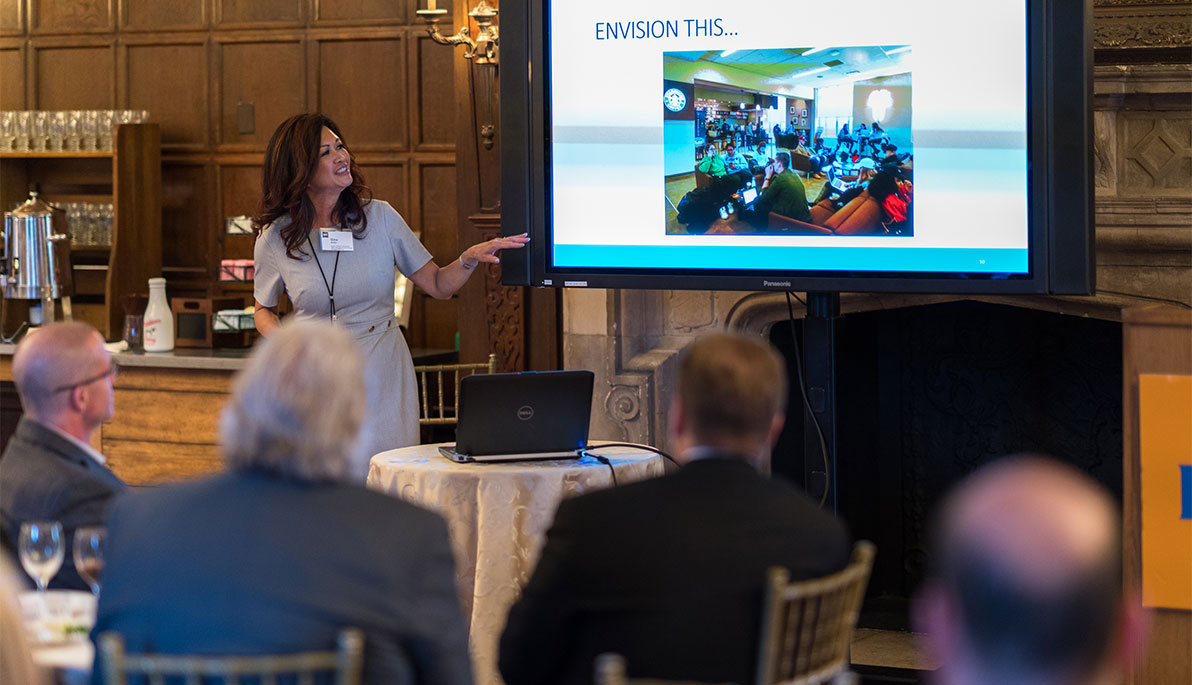
Campus Conversations: Building a Better NYIT
May 9, 2018
Pictured: Gina Arms, senior director, business office strategy, presents ideas for new academic and student spaces to alumni at a recent Master Planning session.
Mark Hampton, Ph.D., vice president for Enrollment and Enterprise Analytics, knows the importance of gathering community input, particularly as NYIT refines its recruitment goals, gets ready for institutional reaccreditation, and develops a new vision and strategic plan under President Hank Foley, Ph.D. Here, Hampton tells The Box how valuable input through Campus Conversations and master planning sessions is paving the way for the future of NYIT.
Shortly after her arrival in 2016, Kathleen Gill, NYIT’s director of planning and assessment, realized that in order to implement the university’s then-new strategic plan and help NYIT prepare for its reaccreditation by the Middle States Commission on Higher Education in 2019, she needed to put an ear—or rather, many ears—to the proverbial ground. Engaging faculty, staff, students, and alumni in planning institutional improvement, she knew, was critical.
Working with Francine Glazer, Ph.D., associate provost for educational innovation and the director of NYIT’s Center for Teaching and Learning, Gill put together a team that quickly became the go-to agent of change for a wide range of initiatives—from improving how students pay bills to creating high-impact experiences for students in and out of the classroom. To address these needs, the team launched the much-needed “Campus Conversations.”
“When the campus community became aware that NYIT was seeking a new president, people began to talk about how they would like to see NYIT change. Faculty, staff, and students informally shared what they hoped the new president would bring to NYIT,” Gill recalls. “Campus Conversations became a way to systematically gather these insights, while at the same time build a community voice.”
Then, shortly after his arrival in June of last year, President Foley saw the value of Campus Conversations. Charged by the NYIT Board of Trustees with setting a new vision for NYIT and backing that vision up with a near-term strategic plan, he asked if he could use Campus Conversations to engage the NYIT community in developing those strategies. The results have been transformative as well as indicative of a new era at NYIT of transparency and information sharing.
FEEDBACK IN NUMBERS
Campus Conversations has:
- Held 38 separate sessions.
- Heard from nearly 450 NYIT faculty, staff, students, and alumni.
In just 12 weeks, the Master Planning committee has:
- Visited campuses of 10+ universities which have recently renovated or built spaces for students.
- Held 35 sessions with more than 1000 participants, including 2 town halls for alumni.
- Gathered feedback via surveys from nearly 550 members of our community.
Glazer sums up the impact: “Campus Conversations is unique in that it has started a cultural shift at NYIT. While we have had previous ‘listening meetings,’ they have been focused on specific topics. Campus Conversations has been about better understanding the whole of NYIT, as it is now and how it could be in the future. We are building a continuing cycle of input, response, and change, which I believe will make us stronger as an institution and enable us to respond to new opportunities in a coordinated, effective manner.”
As NYIT’s focus turned to long-range facilities plans for the New York campuses, the Master Planning committee, which is led by Leonard Aubrey, vice president for finance and operations, CFO, and treasurer, was quick to align with Campus Conversations. “We are undertaking this process of gathering community input on a massive scale,” he said. Aubrey, along with Gina Arms, senior director of business office strategy, and President Foley have met with dozens of members of the community to lay out ideas for improved academic and community spaces. Among those are plans for a campus and academic commons in Long Island, which will serve as the heart of the campus, and a re-think of existing spaces in Manhattan for students to relax and collaborate. The group will continue to use the platform as a two-way street to share information and updates about renovation and new construction plans in the months to come.
“People are key to our future—whether they are students, faculty, staff, or alumni. The more successful you are, the more successful we are,” said President Foley at a master planning session with alumni in April. “So we’re looking at an infrastructure that’s exciting for students and will provide them with the spaces they need to be successful.”
When asked about her biggest take-away from Campus Conversations, Gill is effusive: “The discovery of a significant core of faculty, staff, and students ready to work with leaders to develop and implement ideas that will take NYIT to a new level. The community has also expressed appreciation for having their voices heard. Several mentioned that this level of gathering community-wide input is a first in NYIT’s history and they viewed it as a hopeful sign for NYIT’s future.”
Want to get involved or learn about next steps? Email nyitfuture@nyit.edu.
More Features

An Alumnus’ Commitment to the Environment
As an energy management graduate from New York Tech’s Vancouver campus, Jasdeep Gulati (M.S. ’22) is highly invested in educating people about environmental and climate sustainability.

Vancouver Faculty Win University-Sponsored Research Awards in New Program
The new Global Impact Research Grant (GIRG) program has been developed to keep Vancouver-based faculty connected to faculty and research projects being conducted on the university’s New York campuses.

Studying Climate Change One Degree at a Time
Junhua Qu (M.S. ’24) began her collegiate journey in Beijing. But, her interest in climate change took her to New York Tech’s Vancouver campus to study energy management.